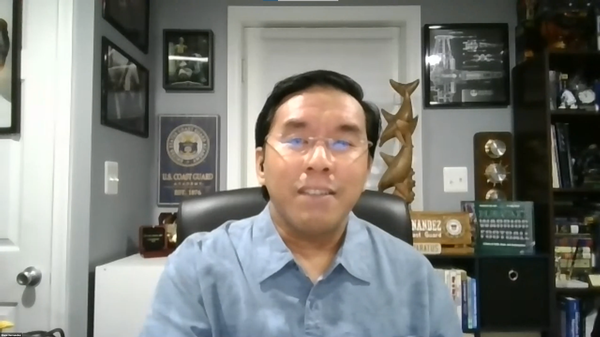For its October luncheon, the chapter hosted Capt. Glenn Hernandez, USCG (Ret). In his presentation, titled "Cyber Workforce Initiatives," Capt. Hernandez reviewed the Cyber Workforce programs developed across government and argued for the need to prioritize the development of the nation's cyber workforce, highlighting a previously unexplored link between the success of government initiatives and public spending on civic education.
Among the largest concerns in the cyber and information technology (IT) industry are the lack of standardized role titles, job descriptions and education/skill set requirements for those positions. The National Initiative for Cybersecurity Education, or NICE, is currently tasked with filling these gaps. Capt. Hernandez elaborated on their contributions: "They have been tremendous. Gathering the stakeholders in the community to drive a standard lexicon for the United States, and in part the world, to try and understand how we can look at workforce more holistically and come up with the standard definitions and terms for all the different roles."
Additionally, the Cybersecurity and Infrastructure Security Agency, or CISA, has devoted considerable resources to standardizing the cyber/IT skill set and strengthening our country's cyber infrastructure. "They offer a lot of training resources you may be familiar with, [such as] FedVTE [Federal Virtual Training Environment]."
In addition to providing training, CISA offers a workforce framework and mapping tool, as well as a "Cyber Career Pathways" tool that allows one to explore different work roles based on personal interest. More information on their contributions can be found at nist.gov/nice and CISA.gov.
Closing his presentation, Capt. Hernandez shared a clip from this past summer's Cyberspace Solarium Commission report, which aims to develop a strategic approach to defending the United States in cyberspace against cyber attacks of significant consequences.
"One of the things that struck me from [the speaker's] comments was the investment we make in our communities, how it is $54 on average per student, but only five cents towards civics." He went on to posit that government efforts to develop a cyber workforce may be hindered by its comparatively low investment in civic education.
"I think it would be informative to find out what that's like in Hawaii."
Capt. Hernandez is a former U.S. Coast Guard chief information security officer and director for the U.S. Cyber Challenge. Today he works as an independent contractor with OpEdge Solutions LLC, a service-disabled, veteran-owned small business that provides professional and information technology services in the areas of program management, solution architecture, infrastructure optimization, cloud computing, cybersecurity and wireless.
|



